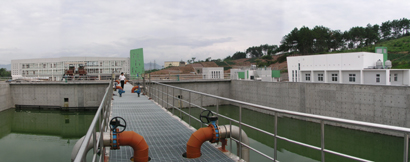An industrial pollution control campaign has been set in motion this year in Liaoning Province, one of China's old industrial bases in the northeastern area, according to provincial environmental protection bureau sources.
The provincial government will spend 7.3 billion yuan to bring the pollution in certain key areas and industries under control over a period of three years.
Environmental pollution has proven to be a hurdle in the development of Liaoning's industries. In its efforts to address the problem, the province will emphasize the control of river pollution and shutting down paper-making plants and printing works that seriously pollute the environment.
The pollution remediation campaign will focus on key industries such as paper-making, painting and dyeing, thermal power, metallurgy, and petrochemicals.
There are also 14 key areas that will receive special treatment. The eight heavily polluted branches of Liaohe River and the upstream area of Dalinghe River will see the establishment of wastewater treatment facilities.
A sewage treatment plant in Fenghua, Liaoning Province
In the central city cluster, the Haicheng and Dashiqiao magnesium oxide polluted area, and the Jinzhou and Huludao molybdenum iron smelting polluted area, the use of clean energy like natural gas, liquefied petroleum gas and electricity will be encouraged.
The aim of the pollution treatment scheme is to effectively resolve the environmental problems that damage people's health, improve regional environmental quality, and considerably reduce total emission of pollutants by 2010.
When all 93 projects are implemented, the emission of sulfur dioxide and smoke dust will be cut by 150,000 and 67,000 tons per year respectively. Besides, dangerous waste treatment capacity will increase by an additional 17.55 million tons.
Toward cleaner water
Shenyang has implemented a large-scale environmental protection movement this month.
Corporations discharging wastewater that fails to meet concerned standards will face a series of punitive measures. They may be put on a blacklist, be required to resolve the problem over a limited term, and be subjected to a huge fine. They will also face greater difficulty in applying for bank loans.
A sewage treatment plant in Jinzhou, Liaoning Province
Environmental protection bureaus at both the municipal and district levels are taking swift and effective action to inspect 109 local enterprises that are regarded as the main wastewater sources in the city.
The month-long campaign aims to punish the companies that violate the environmental protection law. The names of firms committing serious offences will be recorded by the credit system of banks.
(China Daily October12, 2007)







